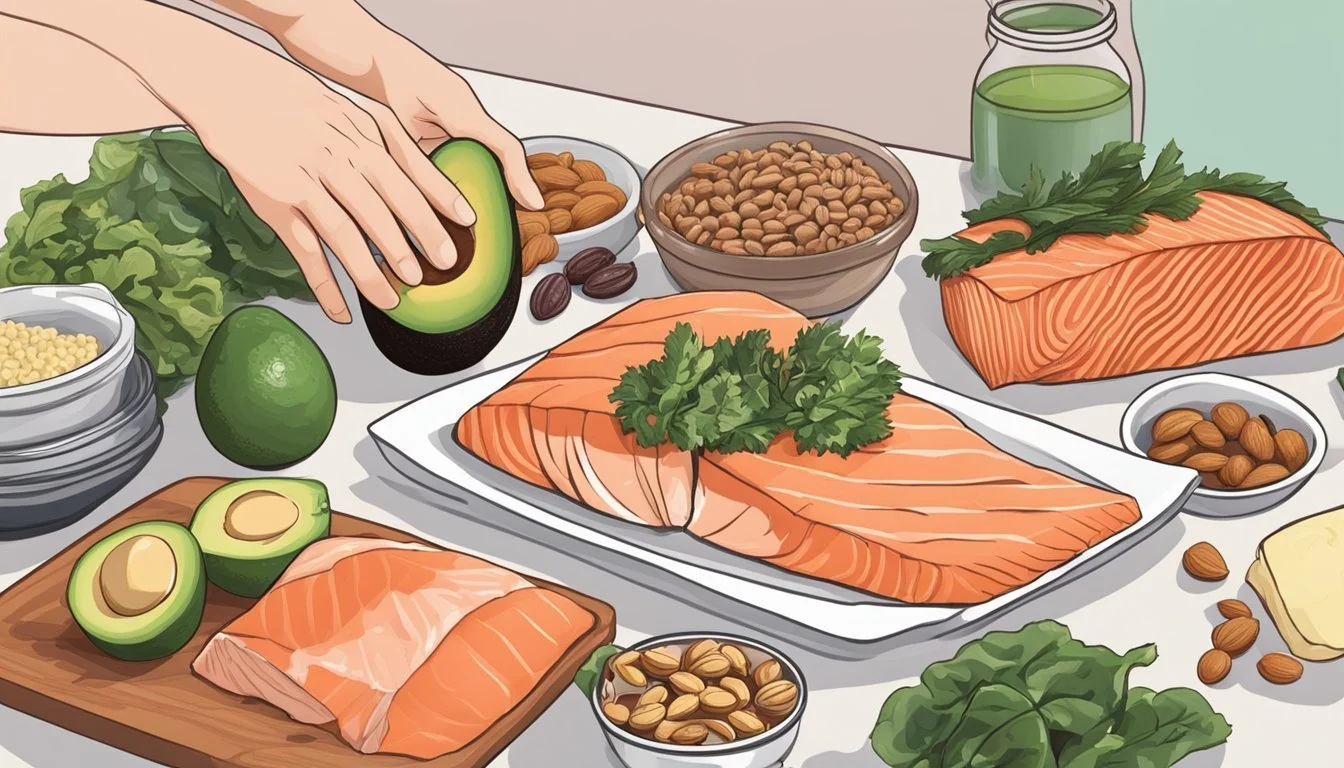Keto Diet and Wound Healing
Exploring the Connection
The ketogenic diet, characterized by its high-fat, moderate-protein, and low-carbohydrate framework, has gained attention for its potential impact on wound healing. This diet shifts the body's energy source from glucose to ketone bodies, a state known as ketosis, which has been linked to various health benefits. Recent studies and anecdotal evidence suggest that the anti-inflammatory properties of the ketogenic diet could play a role in improving the body's healing processes, particularly in repairing damaged tissues.
In the context of wound healing, nutrition is a critical factor that can either expedite or hinder the recovery process. A well-nourished body has access to the necessary building blocks, like proteins, vitamins, and minerals, to repair and regenerate tissue effectively. The ketogenic diet, by influencing the body's metabolic state, might affect blood flow and the availability of these essential nutrients, thereby impacting wound healing.
Nutritional strategies, such as those present in a ketogenic diet, are being explored for their potential to support the body's inherent repair mechanisms. While comprehensive clinical evidence is limited, preliminary studies suggest that a keto-adapted metabolic state might enhance the body's capacity to heal, by reducing inflammation and supporting improved blood flow, alongside providing key nutrients that are central to the healing process. However, it's critical to acknowledge the complexity of dietary interventions and the need for further research in this area to fully understand the implications for wound healing.
Essentials of Keto Diet
The ketogenic diet focuses on altering the body's energy metabolism by significantly reducing carbohydrate intake and increasing fat, which leads to a state known as ketosis.
Defining Ketosis
Ketosis is a metabolic state wherein the body shifts from using carbohydrates to fats as its primary energy source. When carbohydrate intake is very low, the liver converts fatty acids into ketone bodies, which serve as an alternative fuel for the brain and other organs.
Macronutrient Ratios in a Ketogenic Diet
A ketogenic diet typically comprises approximately 70-80% fat, 20-25% protein, and 5-10% carbohydrates. Precise ratios can vary based on individual needs and goals, but the overarching principle is a high intake of fats, moderate proteins, and minimal carbohydrates.
Fats: The cornerstone of the diet, providing the majority of calories.
Proteins: Essential for muscle maintenance and repair but consumed in moderation to avoid conversion to glucose.
Carbohydrates: Intake is kept to a minimum to maintain ketosis.
Role of Fat as a Primary Fuel Source
In the ketogenic diet, fats are not merely an important component; they are the central fuel source. Dietary fats are broken down into fatty acids and glycerol, which can then be used to produce ketone bodies. These ketone bodies are utilized for energy in place of glucose derived from carbohydrates, thereby sustaining the body's functions.
Keto Diet and Metabolism
The Keto Diet substantially alters the body's metabolism, affecting blood glucose, insulin levels, and ketone body production. Here is a detailed look at how these changes impact metabolic processes.
Impact on Blood Glucose and Insulin Levels
When an individual follows a Keto Diet, their intake of carbohydrates is drastically reduced, which in turn lowers blood sugar levels. As glucose levels drop, insulin secretion by the pancreas diminishes. This reduced demand for insulin can improve insulin sensitivity and may help in managing conditions like insulin resistance.
Blood Glucose: Typically decreases due to low carbohydrate consumption.
Insulin Levels: Lowered as a result of reduced blood glucose levels.
Ketone Bodies Production and Utilization
The liver becomes a key player on a Keto Diet as it metabolizes fat into ketone bodies, an alternative energy source to glucose. With carbohydrates scarce, the body shifts to using these ketones for energy, a state known as ketosis.
Liver: Converts fats into ketone bodies (e.g., β-Hydroxybutyrate).
Blood: Circulates ketone bodies to be used as fuel by various tissues.
Effects on Basal Metabolic Rate
The basal metabolic rate (BMR) reflects the number of calories the body requires at rest. Keto Diet's effect on BMR is not entirely clear, but changes in metabolism due to an altered macronutrient balance may influence BMR.
BMR: May be affected by the metabolic shift to fat utilization for energy.
Nutrition and Deficiencies
Proper nutrition plays a pivotal role in wound healing, but the ketogenic diet's restrictions create potential risks for nutrient deficiencies that may impede recovery.
Critical Nutrients for Wound Healing
Wound healing requires an adequate supply of several key nutrients. Vitamin C is essential for collagen formation, which is crucial for wound repair. Zinc plays a role in maintaining skin integrity and immune function. Vitamins A and E support skin health and cellular function, while fatty acids are involved in the inflammatory response that is part of the healing process. Additionally, protein is necessary for tissue repair, and minerals like magnesium and selenium support overall wound healing mechanisms.
Nutrient Function in Wound Healing Vitamin C Collagen synthesis Zinc Skin integrity and immune function Vitamin A Supports skin health and cell growth Vitamin E Antioxidant for cellular protection Fatty Acids Manage inflammation Protein Structural element of tissue repair Minerals Cofactors in healing processes
Risks of Nutrient Deficiencies on Keto Diet
The ketogenic diet, while beneficial for various health purposes, can inadvertently lead to the insufficient intake of some nutrients important for wound healing. Restricting carbohydrates often reduces the consumption of fruits and whole grains, which are primary sources of fiber and certain vitamins such as vitamin C. Dieters may unknowingly limit the intake of collagen-boosting nutrients, complicating the body's natural ability to heal wounds.
Potential deficiencies:
Vitamin C: Commonly found in fruits, which are limited on keto.
Fiber: Crucial for gut health, often lacking due to low carb intake.
Certain minerals: Restricted food variety can diminish mineral intake.
Supplementation Strategies
To mitigate the risks of deficiencies and support wound healing on a ketogenic diet, effective supplementation strategies can be employed. Supplements containing vitamin C, vitamin A, zinc, and other essential minerals can bridge the gap that the ketogenic diet might create. Omega-3 fatty acids are also encouraged to support inflammation regulation and can be supplemented if dietary intake is inadequate.
Key supplements:
Vitamin C: To promote collagen production for wound healing.
Zinc: To bolster skin health and immune response.
Omega-3 fatty acids: To assist in managing the inflammatory phase of healing.
By thoughtfully incorporating these nutrients, either through careful dietary planning or through supplements, individuals on a ketogenic diet can support their body's wound healing capacity without compromising their dietary regimen.
Keto Diet's Systemic Effects
The following section explores the Keto diet's systemic effects particularly focusing on weight management, diabetes control, and cardiovascular health.
Weight Loss and Body Composition
The Keto diet's ability to facilitate weight loss is well-documented, primarily through the reduction of carb intake and the body’s shift to burning fat for fuel. By entering a state of ketosis, individuals often experience a decrease in body fat percentage. The diet has shown effectiveness in combating obesity, as it may promote a higher satiety level due to increased protein and fat consumption.
Keto Diet and Diabetes Management
Individuals with type 2 diabetes may benefit from the Keto diet as it can improve glycemic control by minimizing carbohydrate intake, which directly impacts insulin levels. A ketogenic diet may help reduce the reliance on diabetic medication due to its potential to stabilize blood sugar levels and improve insulin sensitivity.
Potential Impact on Blood Pressure and Metabolic Syndrome
Being on a Keto diet may also influence blood pressure and metabolic syndrome. By lowering the intake of carbs and processed foods, the diet can lead to improved metabolic health, potentially reducing the risk factors associated with cardiovascular diseases. Some reports suggest that the ketogenic diet can improve the lipid profile and reduce insulin resistance, which are key components of metabolic syndrome.
Keto Diet and Inflammation
The Keto Diet is posited to impact inflammation by modulating metabolic responses and influencing the healing processes associated with chronic wounds and diseases.
Anti-inflammatory Effects
The ketogenic diet may reduce inflammation through several mechanisms. One of the primary effects is the reduction of pro-inflammatory signaling molecules. When carbohydrate intake is significantly reduced, the body enters a state called ketosis. In ketosis, the production of ketone bodies appears to downregulate the NLRP3 inflammasome, an element of the immune system known to activate inflammatory processes. Additionally, the diet is believed to decrease the production of reactive oxygen species, which can prompt inflammation. Increased levels of adenosine, a compound that has anti-inflammatory properties, have also been observed in individuals following a ketogenic diet.
Influence on Chronic Diseases
Chronic diseases, such as inflammatory arthritis, are often marked by persistent inflammation. A ketogenic diet has been investigated for its potential to alleviate the symptoms of such conditions. Its approach to reducing dietary carbohydrates appears to enhance the anti-inflammatory state by curbing the body's immune response, which can sometimes become detrimental when overly active. Adherence to a ketogenic dietary pattern may assist in controlling chronic inflammation, thereby potentially influencing the progression and management of inflammatory-related diseases and improving healing in chronic wounds.
Healing Process and Nutrition
Proper nutrition is paramount during the wound healing process, as it supplies essential macronutrients and energy substrates that influence cellular mechanisms critical to repair.
Role of Macronutrients in Wound Healing
Protein: Protein is crucial in wound healing; it provides the building blocks for new tissue and supports the function of key cells like fibroblasts and macrophages. Adequate protein intake ensures the body can produce the necessary collagen and facilitates effective cell migration, a vital aspect of wound closure.
Energy Substrates: Wounds require energy for healing, which is derived from energy substrates like glucose and fatty acids. Ketones, which are produced during a ketogenic diet, serve as alternative energy sources and have been shown to support wound healing by potentially reducing inflammation and providing efficient energy.
Ketogenic Diet and Cellular Healing Mechanisms
A ketogenic diet, high in fats and low in carbohydrates, leads to the production of ketones, altering the body's metabolism. Ketones may supply energy more efficiently during the wound healing process and support the functioning of crucial immune cells. The diet's impact on improving blood flow can further enhance healing by ensuring that nutrients and oxygen are adequately delivered to the wound site.
Moreover, since the ketogenic diet changes how the body utilizes energy substrates, it may influence wound healing by affecting cellular processes and the inflammatory response, which can indirectly optimize the conditions for cellular repair and growth.
Practical Considerations for Wound Healing
When considering wound healing on a ketogenic diet, two main areas require attention: how to balance the high-fat, low-carbohydrate aspect of the diet with the nutrient demands of wound repair, and the transition strategies for those moving from a standard diet to support healing.
Balancing Keto with Wound Repair Needs
Wound healing is a complex process that entails a well-coordinated sequence of biological events and demands adequate nutrition. Protein is vital for repairing damaged tissues. Therefore, individuals on a ketogenic diet should ensure their protein intake is sufficient to support healing. Standard dietary recommendations for wound healing suggest higher protein needs. On a ketogenic diet, one must balance protein intake to maintain ketosis, while still providing enough protein for wound repair.
Supplementation may be necessary to meet the nutritional needs without compromising the state of ketosis. This could include amino acids and other nutrients known to support wound repair. For example:
Arginine can be crucial for collagen deposition and wound remodeling.
Vitamin C and Zinc are important for collagen synthesis and immune function.
Dietary fat intake should be monitored as well, as certain types may influence inflammation. A focus on omega-3 fatty acids could be beneficial, as they are known to help modulate inflammation, which is a critical part of the healing process.
Transitioning from Standard Diet for Healing
Transitioning from a standard diet to a ketogenic diet during a period of wound healing requires careful planning. Individuals should monitor their response to dietary changes and ensure continuous wound healing progress. It might be necessary to adjust the macronutrient ratios gradually to avoid any negative impacts on the healing process.
The body's shift from glucose to ketone bodies as a primary energy source can take time, and during this transition, energy demands for wound healing must be met. Adequate hydration and electrolyte balance are also critical during this phase. A registered dietitian or a healthcare provider may need to closely monitor the individual to provide tailored guidance on nutrient timing and intake to optimize the healing outcomes.
In summary, when incorporating a ketogenic diet into a wound healing protocol, careful consideration of protein and supplementation for nutrient support, along with meticulous dietary planning during the transition from a standard diet, are key to successful outcomes.
Research and Evidence
The relationship between the ketogenic diet and wound healing has been explored in various scientific contexts, including clinical trials, animal model studies, and systematic reviews. The evidence indicates that a ketogenic diet may influence the wound healing process.
Clinical Trials on Keto Diet's Effect on Healing
Clinical trials have studied the keto diet's impact on patients' wound healing speeds and outcomes. For instance, key findings suggest that a Low-carbohydrate, High-fat (LCHF) diet can potentially improve blood flow, an essential factor for efficient wound healing. Trials involving type II diabetic patients have indicated that keto diets might reduce or eliminate insulin requirements, implicating an indirect benefit for diabetic wound management by stabilizing blood glucose levels.
Animal Model Studies
Studies using animal models have shown that a ketogenic milieu could foster nerve repair and regeneration after injury. Such research typically involves rodents subjected to dietary interventions before or after nerve damage. Though variations in animal models, dietary compositions, and timing challenge the synthesis of the outcomes, evidence favors ketogenic diets in promoting neuroprotection and aiding the repair of injured nerve fibers.
Systematic Reviews of Keto and Wound Outcomes
Various systematic reviews have aimed to combine data from disparate studies to evaluate the ketogenic diet's effectiveness on wound healing. A significant conclusion from these reviews is the keto diet's role in neuroprotection and potential to facilitate nerve fiber regeneration post-injury. It's important to recognize that these reviews also highlight the need for greater consistency in research methods to better assess the keto diet's reparative effects on wounds.
Special Populations and Keto Diet
The impact of the ketogenic diet on special populations, particularly children and adolescents, as well as the elderly in the context of wound care, warrants careful consideration due to varying metabolic requirements and health considerations.
Keto Diet in Children and Adolescents
Children and adolescents have unique nutritional needs due to their ongoing growth and development. When implementing a ketogenic diet, one comprised predominantly of fats with very low carbohydrates, it becomes essential to monitor for potential nutrient deficiencies and ensure a balanced intake that supports their growth. In clinical settings, the production of ketones can be therapeutic, particularly for pediatric epilepsy; however, caution is suggested outside of these parameters due to the lack of long-term studies on the ketogenic diet's effects in children for conditions such as wound healing.
Keto Diet in the Elderly and Wound Care
For the elderly, wound healing can be a complex process due to slower regeneration capacities and often compromised metabolic health. A ketogenic diet could potentially offer benefits through the production of ketone bodies like β-Hydroxybutyrate (βHB), which may support the wound healing process. This is hypothesized to work by enhancing energy availability and reducing inflammation. It's crucial for elderly individuals to approach such dietary changes under medical supervision to balance potential benefits with the risks of dietary restrictions and ensure that any implementation of a ketogenic diet does not adversely affect overall nutritional status.
Keto Diet in the Context of Diseases
The ketogenic diet, characterized by its high-fat and low-carbohydrate macronutrient distribution, has been researched for its potential therapeutic effects on various diseases ranging from neurological conditions to cardiovascular issues and even cancer.
Keto and Neurodegenerative Diseases
The ketogenic diet may play a role in neuroprotection and neuroregeneration. It could support the body's ability to repair nerve fibers following injury. Epilepsy, a neurological disorder characterized by recurrent seizures, has shown responsiveness to ketogenic dietary interventions, with studies noting a reduction in seizure frequency. The diet's potential in neurodegeneration extends to conditions like Alzheimer's and Parkinson's disease, where ketone bodies may offer an alternative energy source for the brain, possibly slowing the progression of these diseases.
Impact on Cardiovascular Health and Traumatic Injuries
In the realm of cardiovascular disease, the ketogenic diet has two faces. On one hand, it could lead to improvements in lipid profiles and reduction in inflammation. On the other hand, in the case of diabetic ketoacidosis (not to be confused with nutritional ketosis), high concentrations of ketone bodies could be harmful. For traumatic injuries, such as wounds, a ketogenic diet might promote healing by enhancing blood flow and minimizing inflammation, although the exact mechanisms are not fully understood.
Cancer and the Ketogenic Diet
Research into the ketogenic diet's impact on cancer is still evolving. Some theories suggest that cancer cells have altered energy metabolism, relying heavily on glucose. Thus, a low-carb diet could theoretically starve the cancer cells. Although some studies have reported favorable outcomes, it is vital to approach this research with caution until more conclusive results are obtained. The ketogenic diet is not a stand-alone treatment for cancer but could potentially be used as an adjunct therapy under medical supervision.






